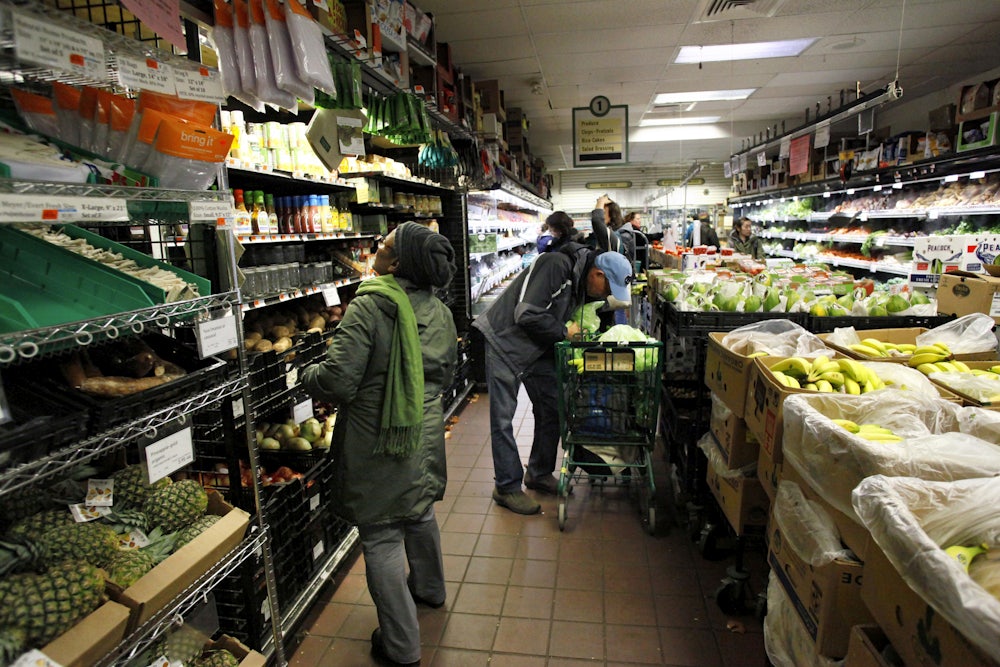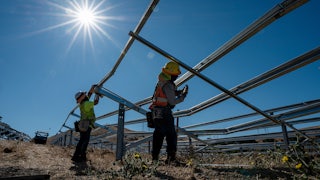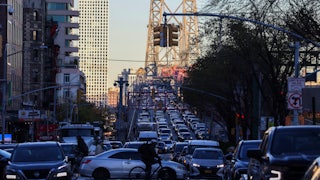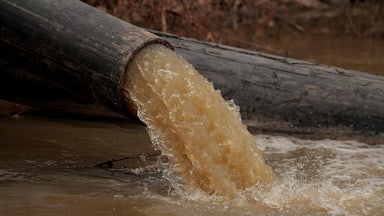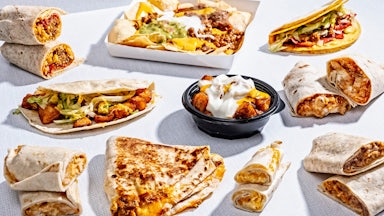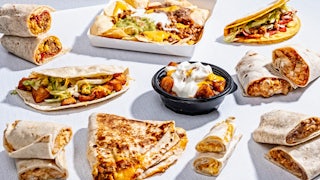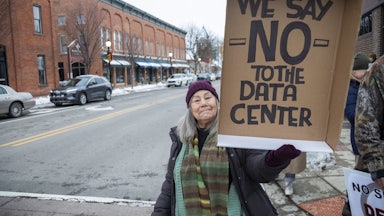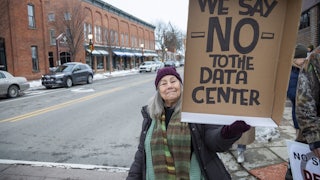Normally, just like everyone else, I just resolve to spend more time at the gym. But as the first Trump inauguration loomed, in early January 2017, my New Year’s resolutions were higher stakes than usual.
I knew that I would have to volunteer more of my time to local politics. I would also try to look after my own sanity: I would read more novels, spend less time online and more time outdoors. But, while I was concerned about bettering the world without losing my mind, I wondered even more how to prepare for the impending societal collapse I feared was coming.
I feared Trump’s presidency vastly increased the likelihood of civil war, meltdown of the government, climate disaster, or collapse of the international order. I did not consider moving to the country, building a cabin, and learning to kill deer and make venison, nor did I price the cost of bunkers on the internet. Instead, I joined my neighborhood food co-op.
I figured that whatever was coming, we’d need to strengthen our local institutions to get through it. I’m not an anarchist. I think we need more government, not less, which is why I joined a socialist organization the same year. I didn’t think, however, that socialism was going to reach us in time to steer us through some of the madness coming our way, and the co-op with its particular structure offered something more immediate and grounded: more food security and options, as well as a way to solve problems collectively if our country found itself in a crisis affecting our food supply.
Now, as in 2020, many are stockpiling goods—bottled water, canned food—in case of a full-on societal meltdown. TikTok has plenty of tips on preparing for January 2025 and beyond—specifically for the eventuality many so-called “preppers” refer to as “SHTF” (for when “Shit Hits the Fan”). In one example, a TikToker surrounded by bags and cartons of dry goods explains what foods are essential, warning, “You want to save this video because the world looks increasingly unsafe, and you don’t want to rely on a fragile food delivery system.”
He’s right. Such hoarding is also a way of managing our fears, not only about the apocalyptic events that may come but of facing them alone, in an individualistic culture and with a far-right government. But this approach hardly seems adequate in case of a real crisis. Back in 2020, this stockpiling reminded me of Laura Ingalls Wilder’s children’s book The Long Winter, which recalls the author’s experience during her Midwestern frontier girlhood, when a blizzard closes down all the train lines. Food can’t get in, and the townspeople are beginning to starve. The Wilder brothers are hoarding their wheat in order to plant it in the spring. Risking his own life so that he may help his community without giving up his own supply, Almanzo Wilder rides off into the blizzard in search of a neighboring farmer rumored to have wheat. Although the books are often taken as libertarian propaganda, the episode, probably unintentionally, reveals the complex reality behind the myth of rugged individualism: If no one shares his wheat, some people will die.
This, in turn, suggests that our communities need greater resilience so that neither hoarding or extreme heroics like Almanzo Wilder’s become necessary. And that realization is part of what drove me to join the co-op.
Ours is an investor- and work-based co-op, meaning that everyone buys a small share and works two and a half hours a month. In the beginning, I worked the floor shift, which means keeping the shelves stocked with products. I have a low tolerance for cold, so I hated standing in the walk-in fridge, but I loved making decisions about what foods most urgently needed to get on the shelves. I relished considering expiration dates, likely popularity, and likely need.
A strong progressive value system informs the merchandising: The co-op members believe that it’s healthier for us, and for the planet, to eat locally, organically, without too many GMOs or additives (and we recently passed a Boycott, Divestment, Sanctions, or BDS, resolution). We bring our own bags.
All this is easy to mock, and I’m not above having fun at the expense of small woke subcultures. Early on, I shared a laugh and an eye roll with a fellow member after our promotional post on our local Thanksgiving turkey offer—a charming photo of turkeys frolicking on their upstate farm—was met with ire by a vegetarian member. And of course, neighbors, including myself, can be annoying in far less well-meaning ways; we are all bossy, intrusive, meddling, forgetful. But the co-op is worth it.
Much of the food sold at the co-op is local, an important food security measure in a country increasingly reliant on long and vulnerable supply chains. For us, that means food grown or raised in Pennsylvania, New Jersey, upstate New York, Vermont, and even on a nearby roof in Brooklyn. This, and the fact that the co-op is run for the community rather than to make a profit, makes me feel a little safer in case of a crisis. It sets a good example too—we all need to strengthen such communal, voluntaristic institutions so our society will be more prepared if the commercial and governmental sectors break down.
It’s hard to recall what kind of a crisis I thought was coming; Trump’s election had made every bad possible event seem more likely. I must admit, a global pandemic didn’t loom large among my chaotic fears of what the first Trump administration would bring. But when that pandemic came, I did feel more secure knowing that my family would have additional options outside of the fragile for-profit supply chains. And because the food store operates outside market logic, we were able to do all we could to keep neighbors safe, including setting aside designated shopping hours for older and immunocompromised people.
The co-op in my neighborhood helps other local food security efforts: We donate to and encourage members and other neighbors to support a community fridge, which is always open, and anyone who is hungry can take food from it at any time. Community fridges have been a growing phenomenon since the pandemic, helping to curb food waste among the haves and food insecurity among the have-nots.
To be clear, no matter who is president, there is hunger in our society and a high risk of pandemics and superstorms. But, then as now, having an erratic, far-right anti-government narcissist in the White House necessarily leaves our society less resilient and puts more burden on us to make contingency plans.
The federal government, remarkably, offers some assistance to people who want to work with our neighbors to prepare for whatever may come. The Federal Emergency Management Agency, or FEMA, has an impressive array of resources for people wanting to work with others in their community to build resilience for crises. A FEMA program called Community Emergency Response Team, or CERT, offers training in fire safety, search and rescue, and emergency medicine, as well as help finding your local CERT or setting one up if your community doesn’t have one yet. The agency offers targeted programs for teens, campuses, and workplaces as well.
In Rachel Kushner’s new novel, Creation Lake, a character named Bruno is an eccentric intellectual who has become a muse to a community of ecologically minded outlaws. Bruno writes of the contemporary impulse to build a bunker in case of apocalypse: “They think, I’ll be the clever one, the one who survives mass death. But why would you want to survive mass death?” He asks. “What would be the purpose of life, if life were reduced to a handful of armed pessimists hoarding canned foods and fearing each other?”
Bruno is right. Let our New Year’s resolutions reflect all that we have learned as humans, whether from nineteenth-century frontier mindset or the 2020 pandemic. Bring that canned food to your community fridge—and ask how else you can help build resilience with your neighbors in case “SHTF.” Eight years later, I’m still a food co-op member. Maybe next month, I’ll check out my local CERT.
